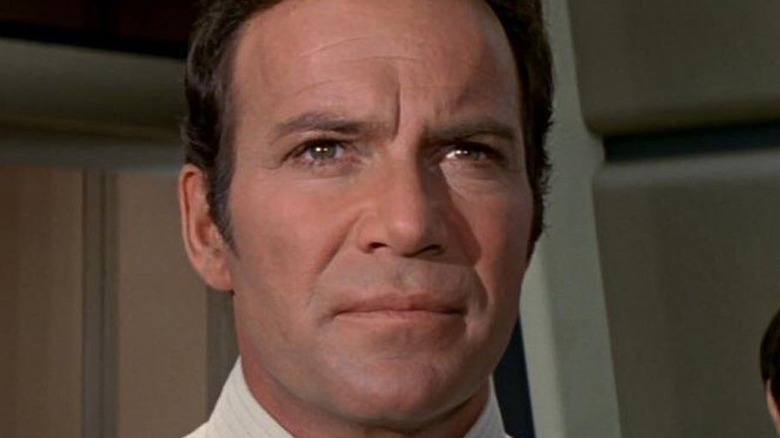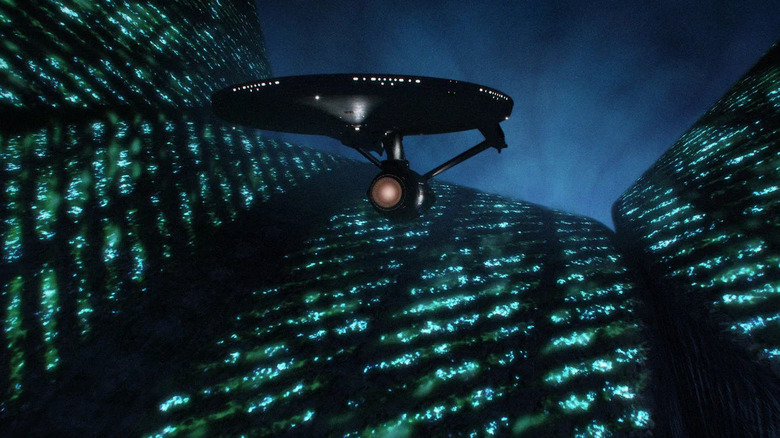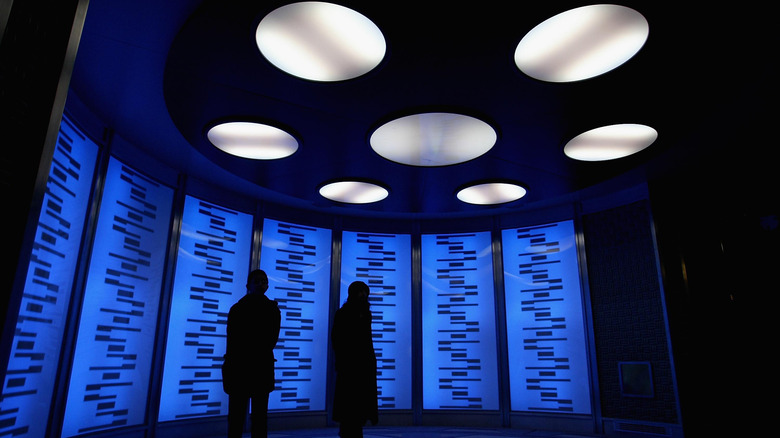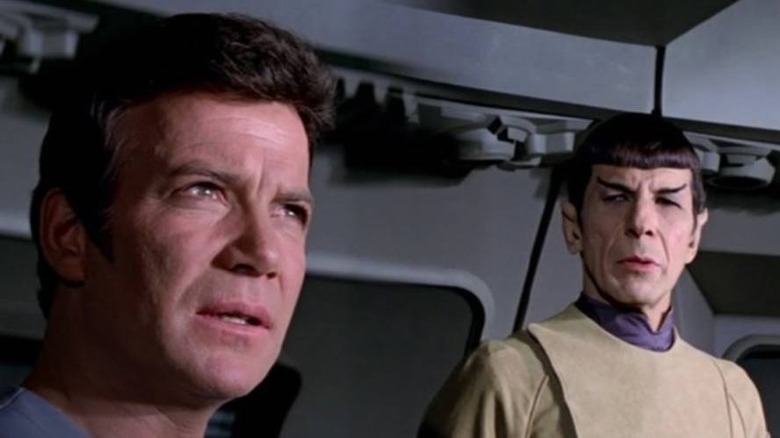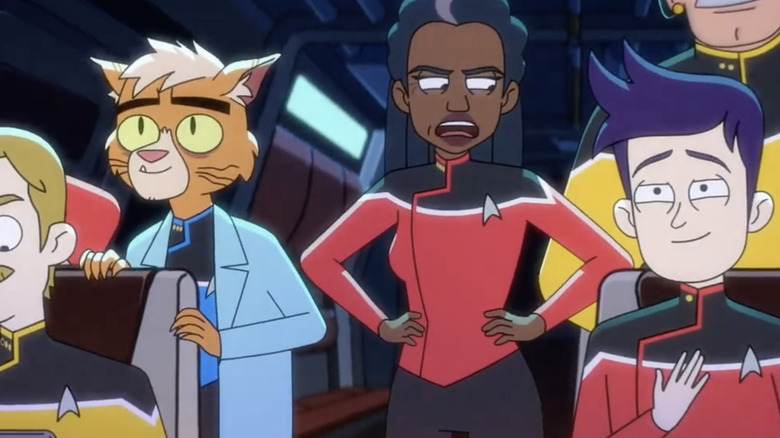David Fein Reflects On The Legacy Of Star Trek: The Motion Picture - Exclusive Interview
"Star Trek" remains an indelible part of pop culture — it transported audiences beyond the stars to look into what kind of future was possible when humanity starts cooperating with one another. It's no wonder the franchise remains relevant all these decades later, with a plethora of television shows now readily accessible as well as a film series that looks as though it's ready to kick up once again.
It's an appropriate enough time to look back at how far "Star Trek" has come and reflect upon the first movie based on the series to come out — "Star Trek: The Motion Picture." Released in 1979, the film received an update in 2001 when a remastered edition, overseen by director Robert Wise, came out. It brought new computer-generated effects, new scenes, and remastered audio to the proceedings, resulting in a brand new experience for Trekkies from all walks of life to enjoy.
Whether you're a newcomer to the "Star Trek" franchise or have seen the original motion picture dozens of times, a new remaster is now available in 4K Ultra HD. The movie looks better than ever before, and Looper had the chance to sit down to chat with producer David C. Fein, who's overseen the development of "Star Trek: The Motion Picture — The Director's Edition." He spoke on all things related to "Trek," from its legacy to the one scene in the movie that absolutely terrified him upon first watching it.
On changes made to the movie
With the 4K remaster, what, in your opinion, is the most impressive effect altered for this version of the movie?
The color grading and the sound work is stunning. It absolutely helps tell the story better than it ever has before in every way. There's so many things we were able to do with the edit, but now to bring the audio up to the level that we could imagine, and the color work, and the sheer ability to change and perfect so much in the film ... I've often said just about every shot has had some change, modification, alteration — just slightly — to bring it to the point where it really draws you in. The fact that it works better than ever before makes me more excited than I can possibly tell you.
In the commentary for the movie, you discuss how "Star Trek" has influenced real-world technology. What other items from the "Star Trek" universe would you like to see make the leap to reality?
I like transporters because it takes too long to get anywhere. Still, [it's] just as terrifying. This was the first film that scared the hell out of all of us. When you think of beaming somewhere, but then coming together to something that, as they say, doesn't live long — that's terrifying. That idea, plus the medical advances that have happened ... it's funny.
A little tidbit is that when we did the project originally, I got everybody on the project the Motorola i1000, which was a communicator, because we could communicate with each other. I was talking about how this time, you actually could use the Apple Watch as the communicator, which is closer to where motion picture is. But we are getting there every step. Look at the pad that they've used in "Next Generation" and even classic "Star Trek." They didn't show it as much, but that technology is the iPad where we are today.
We keep getting closer and closer, but other than the other standards of warp speed and traveling to other worlds, transporters are a great idea. All I can think of is how we can digitally enhance films and be able to do everything digitally perfected. Imagine if that could happen with a person — not that we're changing personality, but something happens where you could beam and even use it for medical purposes, being able to fix certain problems or otherwise, where we all become ones and zeros. [That] also goes back to the whole concept of the movie of ... technology without humanity is cold.
Touch-tone phones were the most advanced thing at the time. Now we have iPhones with social media. If we even go further with transporters of the digital, where's the humanity in it? It brings up some other interesting questions of ethics, too. If you can make a change, but if you don't like someone and you're not having a good argument — not succeeding in an argument — you beam them somewhere and change their opinion. No, that's too dangerous. But I do love the stories about technology in general.
Terrifying technology
Going back to the transporter, how did that scene impact you the first time you saw the film?
It was always terrifying in concept. I'll tell you a little secret, which, of course, it's not a secret because I'm sharing it. One of the problems that we had early on in the production and went to the DVD version is that the rating of G had evolved from being a film for general audiences to a kid's film. I knew a few things. Number one — this isn't a kid's film, "Star Trek: The Motion Picture." But number two, if we were able to have that rating re-rated and changed to PG and motivated, it would not only represent the film better, but it would also raise curiosity about what could you possibly do to the film to bring it to that level. At that time, I went to my sound people and said, "Bring in everything. I want nails on a chalkboard level of hair standing up on the back of your neck during the transporter accident."
One of the quotes that I remember that I kept going back to is — imagine you are this deformed mass thinking, looking for a way to scream, and you don't have anything to scream from until finally something opens. God, I'm scaring myself. But something opens and that's the sound that comes out. That's what I was going for. That I attribute to getting the PG rating. But it's also the most horrifying death in all of "Star Trek" in some cases. I don't think they did that too many other times. I guess it was frightening.
The legacy of Star Trek
Why do you think "Star Trek" has remained so influential all these decades since the original movie and the original series first came out?
Optimism — absolutely optimism. I am the ultimate optimist myself. I see the positive in everything. When there's something negative, I turn around and try and find the positive in any way to do it. But "Star Trek" always inspires, and it always inspires us to be better than we are, and in the world where we try to do our best, to just be better.
Even in the worst cases, in some "Star Trek" history, there's always a moral to it. I like the moral story. I like where it tries to take us. It's intelligent as well, something that makes you think, and that's one of the things that's made a big difference to me. So many people have been saying that they've seen the film for the first time right now. It's not insulting ... Insulting intelligence is what people say about some films.
It's not spoon-feeding you a story. It's helping you think about what the results are of what's being presented. That's beautiful to give you something to think about. Everyone says that they see this ... The teens and the 20-somethings that are seeing the film are saying they left and [they're] still thinking about it. It's surprising, but that's what great films are — something that inspires you.
That's what "Star Trek" [has] been doing over the years. It gives you something more to ponder [about] how it relates to your life. That was one of the things that Gene [Roddenberry] was doing in classic "Star Trek": "I'm going to tell stories about Vietnam. I'm going to tell stories about interracial relationships. I'm going to show stories about intolerance but have it be aliens." By telling it about some other race, anybody can accept it because it's not us — when it really is a story about us. That's a certain amount of brilliance in the storytelling that "Star Trek" has always inspired. This too.
David Fein's thoughts on other Star Trek projects
With so many different "Star Trek" projects in the works now — "Picard," "Strange New Worlds," "Lower Decks" — are there any "Star Trek" shows on right now that you're a particular fan of?
I've watched "Picard." I'm watching all of them. I enjoy "Lower Decks." I was concerned that it would be a little ... I enjoy the positive nature of the shows. I love [that] the humor is with us, not about or against those who love it. I sometimes feel things like "Big Bang Theory," sometimes tongue-in-cheek, laugh at being a fan. It's important to me that it expresses the love of the franchise and shows it in a positive light in so many ways. [With] "Picard," I'm happy to see that people are coming back, that it's carrying on the same story, but I'm happy about "Motion Picture" too, that "Motion Picture" [is] back. I like focusing on that.
Is there anything you'd like done to the original "Motion Picture" further down the line, perhaps for a 50th-anniversary re-release?
Films are always abandoned. What we have right now in regard to where we are is because there's been so many technological advancements. Bob [Wise] was inspired and inspiring in using all the tools that were available to us to tell the best story. My focus here is when it comes down to a 50th anniversary, Atmos may be even better. There may be ways to improve it.
There's been a rumor that they found that if you dig deeper into the negative of a movie, it may have been light field photography, which is where they discovered that you had the wonderful dynamic range that you never knew before that became HDR. [This] means every film is better than you ever could imagine because it was more photographed. We presented in HDR.
There's some speculation and some tests being done right now to see that everything could have been filmed in 3D. I'm excited about, what are those possibilities? It's not so much how this film would be changed in some way. There's little things that I'd like to tweak here and there. But if those discoveries happen, how much better could the film tell its story? Imagine if everything was 3D, if suddenly now you could take a film and have it be 3D, but not fake, not reproduced, not balanced by an intentional decision, but having it be that way. I'm excited to see what the advancements are.
"Star Trek: The Motion Picture — The Director's Edition" on 4K Ultra HD Blu-ray™ is available now, complete with new and legacy special features from Paramount Home Entertainment. Additionally, the "Star Trek: The Original Motion Picture Collection," featuring all six big-screen adventures with the original series crew, is also available on 4K Ultra HD.
This interview was edited for clarity.
